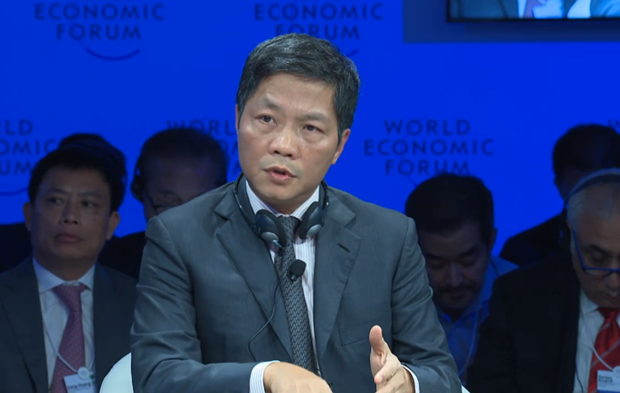Minister: Vietnam’s e-commerce is growing fast in 4IR
 Minister of Industry and Trade Tran Tuan Anh (Photo: VNA)
Minister of Industry and Trade Tran Tuan Anh (Photo: VNA)
Hanoi (VNA) – A senior trade official has said that Vietnam’s e-commerce sector is growing at a rate of 35 percent a year and predicted to be worth 10 billion USD by 2020 and that to make this ambitious forecast a reality, a far-reaching domestic approach is essential.
“Vietnam has made it overall national strategies to develop digital market and e-commerce,” Minister of Industry and Trade Tran Tuan Anh told a session on Digital Markets and Global Opportunity that took place on September 13 in Hanoi as part of the ongoing 27th World Economic Forum on ASEAN. “We ensure open environment for all individuals to take part in e-commerce, digital markets,” Anh added.
According to the minister, Vietnam needs to strike a balance in strategy for development, infrastructure and workforce training.
While the foundations are in place, with communication infrastructure covering almost 90 percent of the country, internet users still only make up around 55 percent of Vietnam’s population.
Once internet penetration is achieved across the region, the next step is for owners of small and medium-sized enterprises (SMEs) to learn how to move their business from offline to online.
The session saw a panel discussion on how ASEAN digital market drives inclusive growth through building growth in e-commerce, expanding trade in services, and facilitating cross-border data flows.
The panel participants also included Toby Edwards, Chief Executive Officer, Shipa Freight, United Arab Emirates; Gerry A. Mattios, Expert Vice-President, Bain & Company, Singapore; and Bharathi Viswanathan, Chief Information Officer, Asia-Pacific Group, the Coca-Cola Company, Singapore.
Panelists agreed inclusive internet access, education and cross-border collaboration are needed to propel Asia’s digital market into the global economy.
Chief Information Officer Bharathi Viswanathan explained that many of the thousands of “mom-and-pop cafes” all over ASEAN have found their businesses disrupted by the region’s numerous food delivery apps.
While they now have access to a much wider base of consumers, they are also facing the challenge of navigating digital platforms and baffling algorithms.
By teaching business owners how to use the platforms and attract customers with combo deals, the global beverage brand is turning the disruption to both their advantage.
“For me it’s about creating shared opportunity which creates a good future for everyone. It’s us and them and the platforms,” said Viswanathan.
Also helping to educate a new generation of digital entrepreneurs is the team behind Shoppy, a Singapore-based online marketplace. The company has set up the Shoppy University, teaching would-be sellers everything from how to take promotional photos of their products to how to utilize inventory management tools.
Santitarn Sathirathai, Group Chief Economist of Shoppy’s umbrella company Sea, said building digital fluency from the ground-up is a win-win situation. “It’s about empowering the sellers, wherever they are in the world,” Santitarn Sathirathai said.
But barriers in the global digital trade still exist. Toby Edwards, Chief Executive Officer of Shipa Freight, a digital logistics platform based in the United Arab Emirates, said their in-house survey of 800 SMEs in eight countries revealed that 94 percent have difficulties when shipping their products abroad.
While his company works to minimise the barriers by making the numerous regulatory documents needed for international trade available online, Edwards said that he believes trust across borders and a simplification of the process is essential for the digital economy to reach its full potential.
“Trade follows the path of least resistance,” he told the participants. “As a country, the easier you make it to do business the more business you will attract.”
To achieve such streamlining, governments must shed their fear of sharing data and foster collaboration, said Gerry A. Mattios, Expert Vice-President of Bain & Company, a firm specialising in global supply chain solutions.
“We believe, based on our research, that the issue of data is similar to the issue of trade. The lower the borders and barriers the better it will be for the economy,” he said. “It’s almost impossible to have cross-border trade without data. It’s like trying to fly without wings. You won’t get very far.”-VNA













